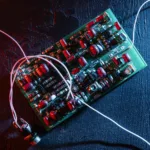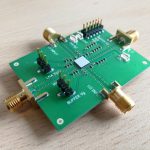
Introduction
In the fast-paced technological world, robust connectivity and networking components are the key–ensuring seamless communication and data transfer. One of the most common and widely used connectors for Ethernet networking is the standard RJ45 connector. However, as technology evolves and data demands increase, there is a growing need to upgrade these connectors to meet the demands of the next generation of networking. This article takes a look at the upgradation of standard RJ45 connectors into next-gen connectors, their importance, and the benefits they offer.
Understanding RJ45 Connectors and Next-Gen Connectors
RJ45 (Registered Jack 45) is a standardised connector used primarily for Ethernet networking–connecting computers, switches, routers, and other network devices. These modular connectors are designed to accommodate eight individual wires for transmitting data using Ethernet protocols. RJ45 connectors use an 8P8C (8 positions, 8 contacts) configuration and are used with twisted pair cables, typically Cat5e, Cat6, Cat6a, or Cat7 cables. Additionally, RJ45 connectors are used for both Ethernet data connections and Power over Ethernet (PoE) applications, where electrical power can be transmitted over the same cable used for data.
“Next-Gen” connectors generally refer to the more advanced connector technologies that improve upon or provide additional features compared to traditional connectors like the RJ45. They are designed to support higher data rates, have improved shielding, have a small form factor, are durable, and are backwards compatible, meeting the evolving needs of data transmission and connectivity. RJ45 10GBASE-T, RJ45 25GBASE-T, 40GBASE-T, and M12 connectors are examples of next-gen connectors, paving the way to keep up with the evolving digital landscape.
RJ45 Connectors: The Need for Next-Gen Connector Upgradation
Upgrading RJ45 connectors into next-gen connectors is essential to keep pace with the ever-evolving world of networking technology. The following are the reasons why these standard connectors should be upgraded to the next-gen connectors:
Increasing Data Speeds
One of the primary drivers for upgrading standard RJ45 connectors is the ever-increasing quest for higher data speeds and bandwidth. With the advent of technologies like 5G, the Internet of Things (IoT), and data-intensive applications, the standard RJ45 connector’s maximum data transfer rate is no longer sufficient for many applications. Next-gen connectors aim to provide faster data transfer speeds, some even reaching up to 40 Gbps and beyond, to meet these new requirements.
Improved Performance and Reliability
Next-gen connectors are designed to offer improved performance and reliability. They often feature enhanced shielding to reduce electromagnetic interference (EMI) and crosstalk, leading to more stable and error-free data transmissions. These capabilities of next-gen connectors are particularly crucial for industries, including healthcare, finance, and gaming, where data integrity and low latency are of utmost importance.
Smaller Form Factor
The standard RJ45 connector’s relatively bulky size can be a limiting factor, especially in scenarios where space is at a premium. Next-gen connectors offer a smaller form factor while still delivering high-speed data transmission, making them suitable for multiple applications, including ultrabooks and other portable devices.
Compatibility with New Technologies
Advanced technologies like Power over Ethernet (PoE), 5G, and 25G/40G Ethernet demand higher data rates and lower latency, making them incompatible with traditional RJ45 connectors. Next-gen connectors are engineered to be compatible and accommodate these emerging technologies seamlessly.
Improved Energy Efficiency
Next-gen connectors are energy-efficient–consuming less power compared to standard RJ45 connectors. Robust energy efficiency is significant for devices that rely on battery power, such as smartphones, laptops, and IoT devices. Highly energy-efficient next-gen connectors reduce operating costs and contribute to a greener, more sustainable future.
The Benefits of Next-Gen Connector Upgrades
Next-generation connector technologies offer several advantages for network administrators, businesses, and end-users over standard RJ45 connectors, including:
Future-Proofing
Investing in next-gen connectors is a strategic move to future-proof your network infrastructure. With technological advancements, bespoke connectors will support the higher data speeds and emerging technologies required to stay competitive in various industries.
Improved Network Performance
Next-gen connectors offer improved network performance, including higher data transfer rates and reduced latency. This translates to faster data access, smoother video streaming, and improved overall user experiences.
Enhanced Reliability
With better EMI shielding and reduced crosstalk, next-gen connectors provide a more reliable network connection, making them suitable candidates for critical applications where data integrity is paramount.
Simplified Infrastructure
The backward compatibility of next-gen connectors allows you to upgrade your network gradually without requiring a complete overhaul. This simplifies the transition to higher-speed connectivity and reduces downtime.
Versatility
Next-gen connectors are versatile and can be used in a wide range of applications–from data centers to industrial settings and even home networks. Their compatibility with emerging technologies ensures they will remain relevant for years to come.
Final Words
Upgradation of standard RJ45 connectors into next-gen connectors is a necessity that typically involves improving upon certain aspects of the existing RJ45 design to accommodate faster data speeds, better performance, and enhanced features. While traditional RJ45 connectors have served us well, the future of networking requires advanced (next-generation) connectors to keep up with the pace of technological advancement. By upgrading to next-gen connectors, businesses and individuals can ensure their network infrastructure is ready to tackle the challenges of the future while enjoying the benefits of faster and more reliable connectivity today.





















